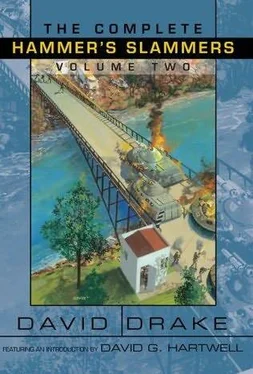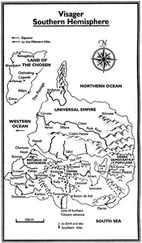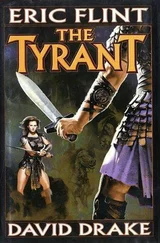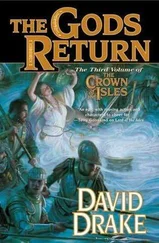There is immense sympathy for the character who has done repulsive things in battle to win, and finds it difficult to live with himself afterward. There is much evidence in Drake's personal afterwords to his books that he identifies with that position and that it relates to his own military experience (see, for instance, his essay "How They Got That A Way").That is how we most often return to experience the horror,through personal connection with character,after our detachment has been required by all the distancing devices. If you remain detached, you are not getting it, or rather by saying to yourself, in effect undisturbed, "yes, this is the way war is," you are denying any broader literary meaning. This is the paradox of Drake's military fictions.
All of the above is evident in his early stories and in Ranks of Bronze , and many other novels. It is the essence of the Hammer's Slammers stories. I'd like to talk about a particular story now to extend the point about broader literary meaning.
Drake's novella, "The Warrior,"is superficially about tank warfare,and about the contrast between the attitudes and behaviors of two commanders of tanks in the Slammers, Sergeant Samuel "Slick" Des Grieux and Sergeant Lucas Broglie, during two military operations nearly ten years apart. Reduced perhaps to oversimplification, Des Grieux is a warrior and Broglie is a soldier; Broglie is sane and Slick is not. They hate each other immediately. Slick Des Grieux is the central character, and his battles are observed in close detail. His tanks are both vehicles and war machines, intelligently extrapolated from the impressive and powerful tanks of today. They are big, fascinating machines, like spaceships are, and are central to the SF appeal. The story is set on two distant planets, the battles are against two different enemies, who are relatively faceless and unimportant. But the enemies have hired competent mercenary armies to defend them against the Slammers, and for the climax, Broglie is hired by a company that ends up opposed to the Slammers. And so in the end it is Broglie against Des Grieux.
This is the story of the madness of Achilles, which is horrific. It is David Drake's Iliad (particularly books XIX-XXIV). It is also Drake's criticism of The Iliad , achieved by removing the control of the gods, and the behavior to a different, and psychologically realistic, situation. While literature, as Matthew Arnold said, is the criticism of life, it is also sometimes quite acutely the criticism of other literature, in dialogue with other works. This is one of the central traditions of genre literature, a conversation among texts, but it is somewhat rarer in genre to find that conversation extending to the classics (by which I mean classical literature, not genre classics). There is probably a good master's degree essay, if not a doctoral dissertation, to be done on the classical influences on the Hammer's Slammers stories.
I think I will stop now. This is an introduction intended to compliment Drake fans and to give access to readers who are not already Drake readers, perhaps even to readers who have previously decided, without reading any, that there are no Drake stories worth their attention. Think again. Consider some of the things I have said. Now it is time to read, or reread, some stories.
David G. Hartwell Pleasantville, NYApril 2005
We few, we happy few, we band of brothers; For he today that sheds his blood with me Shall be my brother; be he ne'er so vile, This day shall gentle his condition. And gentlemen in England now abed Shall think themselves accursed they were not here, And hold their manhoods cheap whiles any speaks That fought with us upon Saint Crispin's day.
—Shakespeare
I wouldn't have—and couldn't have—written these stories without being a Nam vet. Because of that and because I'm sometimes accused of believing things that I certainly don't believe, I've decided to state clearly what I think about Viet Nam and about war in general. I don't insist that I'm right, but this is where I stand.
The speech Shakespeare creates for Henry V to deliver on the morning of Agincourt (the Speech on St. Crispin's Day) is one of his most moving and effective. The degree to which the sentiments therein are true in any absolute sense, though—that's another matter.
My own suspicion is that most soldiers (and maybe the real Henry among them,a soldier to the core) would have agreed with the opinion put in the mouth of the Earl of Warwick earlier in the scene. Warwick, noting the odds were six to one against them, wishes that a few of the men having a holiday in England were here with the army in France. One of the leader's jobs is to encourage his troops, though. If Henry'd had a good enough speechwriter, he might have said exactly what Shakespeare claims he did.
A soldier in a combat unit may see the world, but he or she isn't likely to "meet exotic people" in the sense implied by the recruiting posters. (Mind you, one's fellow soldiers may turn out to be exotic people, and one may turn into a regrettably exotic person oneself.) I travelled through a fair chunk of Viet Nam and a corner of Cambodia. My only contact with the locals as people came on a couple Med CAPs in which a platoon with the company medics and the Civil Affairs Officer entered a village to provide minor medical help and gather intelligence.
My other contacts involved riding an armored vehicle past silent locals; searching a village whose inhabitants had fled (for good reason; the village was a staging post for the North Vietnamese just over the Cambodian border, and we burned it that afternoon); the Coke girls, hooch maids, and boom-boom girls who were really a part of the U.S. involvement, not of Viet Nam itself.
And of course there's also the chance that some unseen Vietnamese or Cambodian was downrange when I was shooting out into the darkness. That doesn't count as meeting people either.
I was in an armored unit: the 11th Armored Cavalry, the Blackhorse Regiment. Infantrymen probably saw more of the real local people, but not a lot more. The tens of thousands of U.S. personnel working out of air-conditioned buildings in Saigon, Long Binh, and other centers saw merely a large-scale version of the Coke girls, hooch maids, and boom-boom girls whom combat units met. The relative handful of advisors and Special Forces were the only American citizens actually living among the Vietnamese as opposed to being geographically within Viet Nam.
I very much doubt that things were significantly different for soldiers fighting foreign wars at any other period of history. Sensible civilians need strong economic motives to get close to groups of heavily armed foreigners, and the needs of troops in a war zone tend to be more basic than a desire to imbibe foreign culture.
Soldiers aren't any more apt to like all their fellows than members of any other interest group are. In school you were friends with some of your classmates, had no particular feelings about most of the rest, and strongly disliked one or two. The same is true of units, even quite small units, in a war zone. The stress of possible external attack makes it harder, not easier, to get along with the people with whom you're isolated.
And isolated is the key word. We changed base frequently in the field. One day we shifted an unusually long distance, over fifty miles. The tank I was riding on was part of a group that got separated from the remainder of the squadron. We had three tanks, four armored personnel carriers modified into fighting vehicles (ACAVs), an APC with added headroom and radios (a command track), and a light recovery vehicle that we called a cherrypicker though it had just a crane, not a bucket. We ran out of daylight.
By this point three ACAVs and the command track had broken down and were being towed. The remaining ACAV and one of the tanks were going to blow their engines at any moment. All the vehicles were badly overloaded with additional weapons and armor, and the need to pack all the squadron's gear for the move had exacerbated an already bad situation.
Читать дальше












